| Srl | Item |
| 1 |
ID:
080360
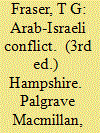

|
|
|
|
|
| Edition |
3rd ed.
|
| Publication |
Hampshire, Palgrave Macmillan, 2008.
|
| Description |
xvi, 214p.pbk
|
| Series |
Studies in Contemporary History
|
| Standard Number |
9780230004696
|
|
|
|
|
|
|
|
|
|
|
|
Copies: C:1/I:0,R:0,Q:0
Circulation
| Accession# | Call# | Current Location | Status | Policy | Location |
| 053107 | 956.04/FRA 053107 | Main | On Shelf | General | |
|
|
|
|
| 2 |
ID:
115335
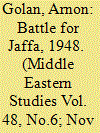

|
|
|
|
|
| Publication |
2012.
|
| Summary/Abstract |
Modern armies conduct military operations in urban areas, but rarely do so willingly. Military commanders prefer fighting in open terrain in which forces freely maneuver and use firepower, rather than in urban areas in which obstacles such as tall buildings, narrow streets, and non-combatants hinder control of the battlefield. Most professional military literature recommends refraining from fighting in urban areas and considering urban battles an unfortunate aberration to be avoided in the future. Deliberate choice of an urban battlefield is quite exceptional, deriving mostly from strategic needs or due to the symbolic value ascribed to a particular city or town. Most decisive battles of the first Arab-Israeli war in 1948 were fought in open areas. However, strategic and political considerations, as well as cultural and sentimental, caused both sides to fight in cities and towns, such as in the case of Jaffa and Tel Aviv metropolitan area, Palestine's major economic center and a main road junction. Both cities also held sentimental value: the dynamically developing modern Jaffa was a symbol of an emerging Palestinian nation while Tel Aviv, the "first Hebrew city," was the Zionist ideal of urban development.
|
|
|
|
|
|
|
|
|
|
|
|
|
|
|
|
| 3 |
ID:
162024
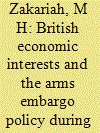

|
|
|
| 4 |
ID:
117564
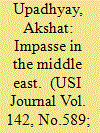

|
|
|
| 5 |
ID:
114262
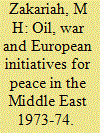

|
|
|
|
|
| Publication |
2012.
|
| Summary/Abstract |
The Arab-Israeli wars since 1948 resulted in several peace treaties between Israel and its neighbours brokered by the US, the Soviet Union and European countries in an attempt to achieve a just and lasting peace settlement in the Middle East. All efforts however proved ultimately futile, with the resumption of war several years after each peace treaty had been signed. For example, after the Six Day War of 1967, all parties agreed to accept a peace treaty based upon United Nations Resolution 242. However, six years after the tabling of the resolution, war broke out again on October 1973. Another long process of peace settlement ensued which culminated in the Camp David Accords, brokered by President Jimmy Carter. These peace accords, signed between President Anwar Sadat of Egypt and Menachem Begin of Israel on 17 September 1978, led directly to the Israel-Egypt Peace Treaty of 1979. Despite its success, the 1979 treaty yet again failed to achieve the just and lasting peace settlement that had been expected. In all these treaties, the core issues of the conflict, such as the Palestinian refugee problem and the status of East Jerusalem, failed to be resolved. This article examines the British attitude and perspective towards the peace settlement after the 1973 war, focussing on the proposal for an International Peace Guarantee and the initiative of the Euro-Arab Dialogue. Based upon declassified archival records of the Foreign and Commonwealth Office available at the National Archives in England, it unveils the attitude of the British government towards the UN Resolutions as well as its collective initiatives with the European Community to establish a just and lasting peace settlement in the Middle East.
|
|
|
|
|
|
|
|
|
|
|
|
|
|
|
|
| 6 |
ID:
184584
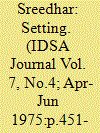

|
|
|
| 7 |
ID:
124748
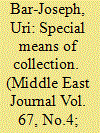

|
|
|
|
|
| Publication |
2013.
|
| Summary/Abstract |
Israeli narratives of the 1973 Arab-Israeli War highlight the army's lack of preparedness in the wake of a successful surprise attack by Egypt and Syria on the Jewish holiday of Yom Kippur, despite assumptions of Israel's intelligence gathering capabilities. Using recently declassified government documents, this article reveals a communication breakdown among Israel's leadership over the operational status of a top secret means of surveillance. This intelligence failure provides the missing link between Israel's wealth of information and the decision to avoid mobilizing the country's reserve army until it was too late.
|
|
|
|
|
|
|
|
|
|
|
|
|
|
|
|
| 8 |
ID:
130844
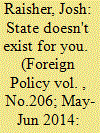

|
|
|